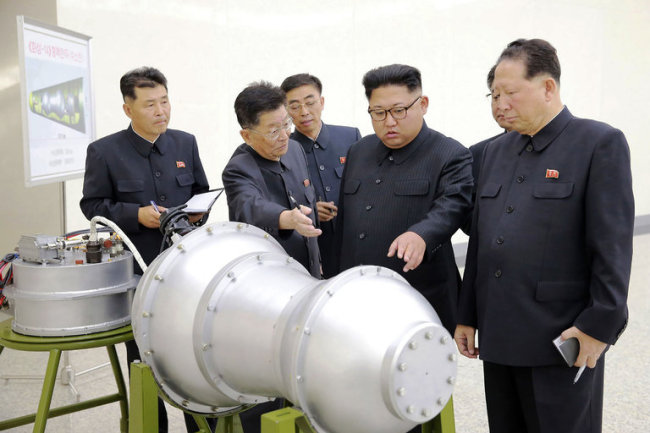[Newsmaker] Four steps to take if war breaks out
The possibility of a full-blown war is deemed low, but there is no harm in preparing for the worst-case scenario.
By Bak Se-hwanPublished : Sept. 5, 2017 - 16:21
It appears experts and government officials here and abroad have yet to decide just what to think of North Korea’s latest nuclear test Sunday. But for ordinary South Koreans, one thing looks clear: North Korea’s weapons program has made significant progress. In other words, those in South Korea are now at greater risk.
The possibility of the ongoing military tension evolving into a full-blown war is still deemed low, but there is no harm in preparing for the worst-case scenario.
Even in a nuclear war, there is a way to survive. Here is how to react in the event of a North Korean attack, based on guidelines provided by the Ministry of Public Administration and Security.
The possibility of the ongoing military tension evolving into a full-blown war is still deemed low, but there is no harm in preparing for the worst-case scenario.
Even in a nuclear war, there is a way to survive. Here is how to react in the event of a North Korean attack, based on guidelines provided by the Ministry of Public Administration and Security.

1. The basics
Despite living under constant threat of war, South Koreans rarely possess emergency supply kits at home or know how to assemble one. This may be an opportunity to put one together, since it is helpful not just in war, but in other emergencies, such as an earthquake or flood.
According to the Security Ministry, the kit should at least include these items: necessary medications, a battery-powered radio with extra batteries, a flashlight, candles, gas masks, as well as food and water for at least three days.
Experts also advise families to think of their own contingency plan, such as when and how to contact one another in case of an emergency.
As for foreign residents, stay tuned to your respective embassy if you feel a war may break out, as your home country may have a plan sorted out for you.
“Once you have decided to leave the country, you should follow evacuation instructions from your respective embassy, since there may be airlines and airports designated by the government for evacuation,” an official at the ministry said. .
2. In case of North Korean artillery barrage
North Korea often threatens to turn Seoul into a “sea of fire.” South Koreans, so used to the regime’s fiery rhetoric, don’t even blink at such threats. To be sure, though, Pyongyang has thousands of conventional artillery lined up toward Seoul, ready to fire at a moment’s notice.
In such an attack, the first step is to relocate to fallout shelters. Make sure you know where to head when at home, work, school or places where you regularly spend time.
There are around 24,000 shelters nationwide in public buildings, subway stations and underground parking spaces.
Follow the government’s instructions carefully through local broadcasts on TV and radio for evacuation information.
If you cannot find designated shelters near your location, find the nearest building and take cover below ground if possible. Stay there as long as possible until instructed otherwise through official broadcast channels.
Experts recommend getting out of a car if driving during the emergency situation, and to run alongside buildings while keeping as low as possible until you find potential concrete structures to serve as fallout shelters to protect yourself.
3. If it involves chemical weapons?
When a chemical weapons attack occurs, a person must immediately cover his or her face with a gas mask or other cloth, and seek safety in higher places.
Animal corpses are one of the first signs of such attacks. Usually corpses of birds and fish will be spotted on ground and in the water.
High ground nearby such as a rooftop is the most convenient place to seek refuge when a deadly chemical agent is unleashed. Most chemical gases, such as sarin, are denser than air, which means they will sink to the ground.
The wind will carry toxic materials, so an escapee must head toward the opposite direction of the blowing wind.
When in a room, all cracks around windows, doors and other openings should be completely sealed off. Ventilators and air conditioners must be turned off too.
Try to avoid contact with contaminated materials or people. Notify the fire department or government officials of your current location and any possible symptoms as soon as possible. Body parts that were exposed to contamination should be cleansed thoroughly with soap or detergent and all clothing should be sealed in plastic bags.
4. To survive a nuclear blast?
A nuclear bomb can only delivered by a missile and South Korean and US militaries here will be able to detect any preparation for a launch. So there will be a loud alarm going on to alert people on the imminent missile attack, whether it is a nuclear attack or not.
Even in a nuclear attack, there is a chance to survive if you manage to go at least 15 meters below ground. Find subway stations. If there is no underground facility nearby, hide inside lead or concrete structures.
Even if you survived the initial explosion, take cover in the shelter to avoid radioactive ash and dust until further government notice. All food and water must be preserved in a plastic bag, wrap or container to shield it from radioactive decay.
By Bak Se-hwan and Jung Min-kyung (sh@heraldcorp.com) (mkjung@heraldcorp.com)






![[From the Scene] Monks, Buddhists hail return of remains of Buddhas](http://res.heraldm.com/phpwas/restmb_idxmake.php?idx=644&simg=/content/image/2024/04/19/20240419050617_0.jpg&u=20240419175937)







![[From the Scene] Monks, Buddhists hail return of remains of Buddhas](http://res.heraldm.com/phpwas/restmb_idxmake.php?idx=652&simg=/content/image/2024/04/19/20240419050617_0.jpg&u=20240419175937)

![[KH Explains] Hyundai's full hybrid edge to pay off amid slow transition to pure EVs](http://res.heraldm.com/phpwas/restmb_idxmake.php?idx=652&simg=/content/image/2024/04/18/20240418050645_0.jpg&u=20240419100350)

![[Today’s K-pop] Illit drops debut single remix](http://res.heraldm.com/phpwas/restmb_idxmake.php?idx=642&simg=/content/image/2024/04/19/20240419050612_0.jpg&u=)